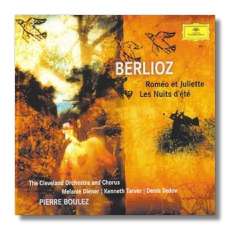
The Internet's Premier Classical Music Source
Related Links
- Berlioz Reviews
- Latest Reviews
- More Reviews
-
By Composer
-
Collections
DVD & Blu-ray
Books
Concert Reviews
Articles/Interviews
Software
Audio
Search Amazon
Recommended Links
Site News
 CD Review
CD Review
Hector Berlioz

- Roméo et Juliette
- Les Nuits d'été
Melanie Diener, soprano
Kenneth Tarver, tenor
Denis Sedov, bass
Cleveland Orchestra & Chorus/Pierre Boulez
Deutsche Grammophon 474237-2 DDD 2CDs: 57:23, 66:47
Hector Berlioz's music has been a steady undercurrent in the career of Pierre Boulez, a conductor famed mostly for his interpretations of 20th-century works. This new recording of Roméo et Juliette – his first, I believe – is not a disappointment. Boulez is always thoughtful and detail-oriented, but here he is also genuinely heartfelt. In Shakespeare, we know the dismal fate of the lovers from the outset. Emile Deschamps's French adaptation doesn't tell us that "a pair of star-crossed lovers take their life," but from the music's beginning, Boulez reminds us that things do not turn out well by continually emphasizing the music's tragic atmosphere. Even the tenor's song about Queen Mab (and later, the Scherzo) seems burdened by Fate. The Capulets' ball is almost menacing, and the Love Scene's ecstasies are mingled with anticipations of the dying falls to come. As Roméo mopes alone, even the distant tambourine, symbolic of the festivities he is about to join, sounds like the rattling of beetles or of bones tossed in an ossuary.
Everyone has worked hard to ensure that not one whiff of Lake Erie intrudes upon this quintessentially French score. (And indeed, there's not a breath of Italy, let alone Verona, in it.) Even a language coach was engaged. The choral work is remarkably refined, and one even hears hints of the good old days (Munch in Boston, Paray in Detroit) in Boulez's control over the Cleveland Orchestra's timbre. The soloists, appropriately, are not stars, but rather distinguished members of the larger ensemble. Having said that, all are fine young singers, and I look for particularly good things from Sedov's Samuel Ramey-like light bass. Although Berlioz asked for a contralto, soprano Melanie Diener's tone is warm enough to do the job in "Premiers transports."
Boulez brings all three soloists back for the delicious Les Nuits d'été. Usually sung by a single soprano or mezzo, this work also can be divided among several soloists, as Colin Davis did in his Philips recording back in the 1960s. Here, Diener sings the first and last songs, Sedov the second and third, and Tarver the fourth and fifth. Thus, we have another chance to become more closely acquainted with these singers. Again, all three turn in thoughtful, idiomatic performances; the men are particularly fine. (Diener can't quite summon up the joie de vivre her ebullient songs suggest.)
While the performances themselves are provocatively restrained, DG's engineering is luscious and warm. The drum at the end of the Queen Mab Scherzo is a particular thrill. Full texts and translations are included. Don't miss this one!
Copyright © 2004, Raymond Tuttle


















